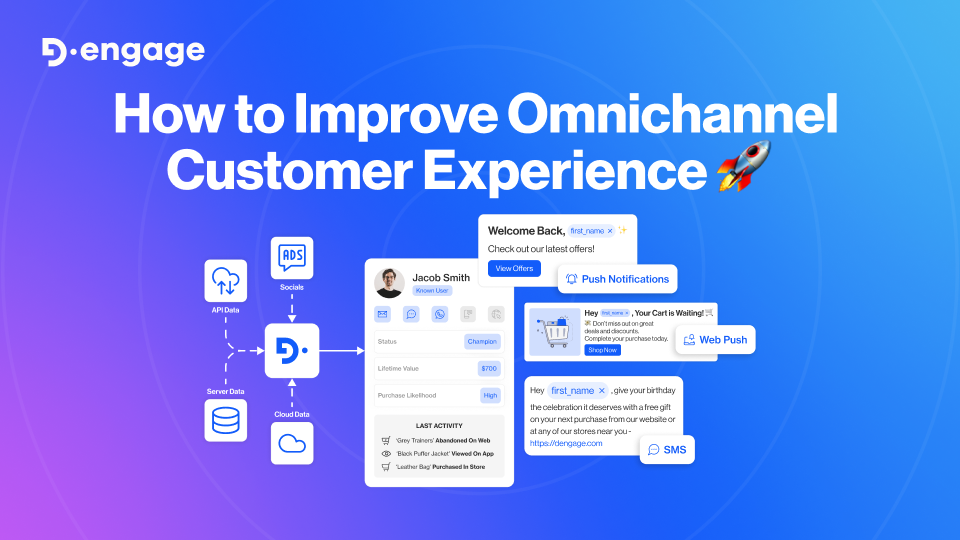In today’s fast-paced digital world, providing a seamless and engaging omnichannel customer experience is crucial for businesses aiming to foster strong relationships with their audience. At Dengage, we specialize in empowering organizations with cutting-edge digital marketing tools and data-driven insights, helping them create meaningful and lasting connections with their customers. In this article, we will explore strategies to improve omnichannel customer experience, supported by industry analysis and statistics.
Understanding Omnichannel Customer Experience
Omnichannel customer experience refers to the unified and cohesive interaction customers have with a brand across multiple channels, both online and offline. This includes websites, mobile apps, social media, email, physical stores, and more. A successful omnichannel strategy ensures that customers receive consistent and personalized experiences regardless of how they choose to interact with a brand.
Key Strategies to Improve Omnichannel Customer Experience
1. Integrate Customer Data
Effective omnichannel experiences begin with integrating customer data from various touchpoints. This unified view enables personalized interactions and ensures that customer preferences and behaviors are consistently tracked and leveraged. Dengage’s Data Integration solution allows businesses to consolidate data from different sources, providing a holistic view of each customer.
2. Personalize Customer Interactions
Personalization is critical in enhancing customer satisfaction. According to McKinsey, companies that excel in personalization generate 40% more revenue from those activities than average players. By using personalized messaging and targeted offers, businesses can create relevant and engaging experiences for their customers.
3. Ensure Consistency Across Channels
Customers expect a consistent experience across all channels. Discrepancies can lead to frustration and loss of trust. Ensuring that branding, messaging, and service quality are uniform across all touchpoints is essential. Dengage’s Omnichannel Marketing solutions help businesses deliver a consistent brand experience across various channels.
4. Leverage Automation and AI
Automation and AI can significantly enhance the omnichannel experience by streamlining processes and providing real-time insights. For example, AI-powered chatbots can offer instant support on websites and social media, while automated email campaigns can deliver personalized content based on customer behavior. According to Lumoa, businesses using AI for customer engagement report a 25% increase in customer satisfaction.
5. Optimize Mobile Experience
With the increasing use of smartphones, optimizing the mobile experience is crucial. A mobile-friendly website, responsive design, and user-friendly mobile apps ensure that customers can seamlessly interact with the brand on their preferred devices. Statistics from Grispi reveal that 65% of consumers say a poor mobile experience negatively impacts their perception of the brand.
6. Utilize Customer Feedback
Gathering and acting on customer feedback is vital for continuous improvement. Surveys, reviews, and social media interactions provide valuable insights into customer preferences and pain points. Using tools like Dengage’s Customer Feedback feature helps businesses collect and analyze feedback, driving data-driven improvements.
Industry Analysis and Statistics
The importance of a robust omnichannel strategy is underscored by several key industry statistics:
- Revenue Growth: According to Lead Genera, businesses with strong omnichannel customer engagement retain 89% of their customers, compared to 33% for those with weak engagement.
- Customer Retention: Research from Mendix indicates that companies implementing omnichannel strategies achieve a 91% higher year-over-year increase in customer retention rates.
- Customer Expectations: A study by Qualtrics found that 75% of customers expect a consistent experience wherever they engage, be it on social media, in-person, or over the phone.
- Sales Impact: According to Hygraph, 73% of consumers are more likely to purchase from brands that offer personalized experiences.
- Customer Satisfaction: CX Today reports that businesses focusing on omnichannel strategies see a 23% increase in customer satisfaction rates.
Practical Tips for Implementation
1. Start Small and Scale
Begin by implementing omnichannel strategies in a few key areas before scaling up. Focus on channels where your customers are most active and gradually expand.
2. Invest in Technology
Investing in the right technology is crucial for a seamless omnichannel experience. This includes CRM systems, marketing automation tools, and data analytics platforms. Dengage’s Technology Solutions offer comprehensive tools to support your omnichannel strategy.
3. Train Your Team
Ensure that your team is well-trained to deliver consistent and personalized experiences. Regular training sessions and workshops can help keep your team updated on the latest tools and techniques.
4. Monitor and Adjust
Continuously monitor the performance of your omnichannel strategies using analytics tools. Dengage’s Analytics Solutions can help you track key metrics and make data-driven decisions to optimize your approach.
Conclusion
Improving the omnichannel customer experience is essential for modern businesses aiming to build strong, lasting relationships with their customers. By integrating customer data, personalizing interactions, ensuring consistency, leveraging automation, optimizing mobile experiences, and utilizing customer feedback, businesses can create seamless and engaging experiences across all channels.
By adopting these strategies, your business can stay ahead of the competition and provide exceptional experiences that drive customer loyalty and growth.
